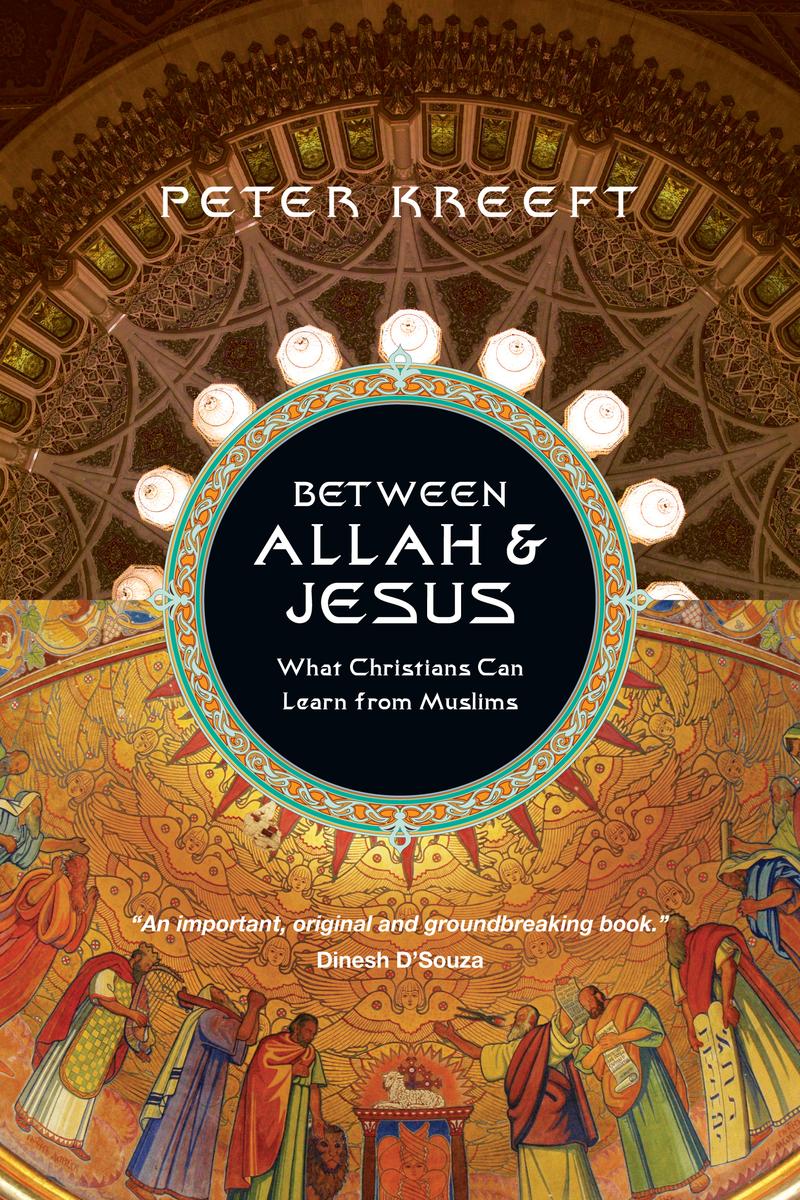Between Allah and Jesus: What Christians can learn from Muslims is Peter Kreeft’s latest attempt to provide Christians with a clear example of how one might interact and find common ground with a person of the Islamic faith. The book is a collection of fictitious conversations between the main Muslim character Isa (Arabic for Jesus) and various personifications of Christian theologies such as a Catholic priest, a feminist Christian, a conservative evangelical, and a liberal professor. In the introduction Kreeft explains that what he wants his Christian readers to learn from Muslims is a sort of “spirit” of Islam rather than a set of individual beliefs or doctrines, thus he chooses to display his argument through conversations, or as he puts it, “I want to show you what it is, by exemplifying it, in a fictional character, like a novelist.”
It should first be noted that the task Kreeft seeks to attain is an admirable endeavor. Christians should, on the most basic noetic level, seek to learn from every tribe, nation, religion, or philosophy. As Christians we should never seek to shirk difficult questions or leave rocks unturned, and this is also true for the Muslim religion. Secondly, we must praise Kreeft for continuing the discussion of the differences between the two religions. With the Muslim religion being one of the fastest, if not the fastest, growing religions in the world today, opening up dialogue to those of the Islamic faith is a needed ministry in today’s churches, and thus Christians need to begin producing tools for the task. Kreeft has also given us an apologetical tool in the area of the Muslim religion. In doing so, the book allows the Christian to gain a window into how a Muslim might argue and give counter points to some of the most basic assumptions of our faith. Thus this book needs to be praised for attempting such a challenging and noble feat.
Given such a noble feat, a few strong warnings should be harkened if one chooses to peruse such a book. Before fleshing out some of these warnings it should be noted that many of these aren’t narrowly directed at Kreeft’s theology in and of itself. Since the main body is written in fictitious dialogue, it is difficult to chart between what Kreeft himself actually believes as opposed to what his characters argue. Thus many of these warnings are explicit of the characters but not implicit of Kreeft’s own view. In many of the conversations a Catholic father chimes in to give a theological word of advice and given that Kreeft is a Catholic himself, it is only through implied guesswork that Kreeft most closely aligns himself with this figure. Nevertheless, there are a few positions from Kreeft that are candidly problematic for a proper Christian worldview.
Warning 1: Kreeft writes this piece presupposing Christians and Muslims ultimately worship the same God, yet they simply understand him differently. In Chapter 3 entitled Jesus and Muhammad, a conversation between Fr. Heerma and Isa arises concerning this very issue and the conclusion is simply that the God of the Muslims and the God of Christians have the same essence. Fr. Heerma argues on page 52 that “Jesus never told the Jews they were worshiping a false God” thus he will not say the same thing of Muslims whose God historically stems from the Jewish faith. As Christian readers our antennae should go up here. It seems as if the Catholic father neglected such clear teaching as John 8:19 when Jesus says to the Jews, “You know neither me nor my father, if you knew me, you would know my Father.” Thus this basic assumption is ill founded and has erroneous outcomes for the entire book.
Warning 2: Chapter 7 promotes anonymous Christianity. Following an argument over who goes to heaven between Isa (Muslim) and Evan (Dutch Calvinist), it seems as if the New Testament clearly teaches that only those who believe in Christ (aka Christians) go to heaven. Since this obviously excludes Muslims, Isa gains another perspective from the Catholic father that declares itself to be both biblical and inclusive of many who are not Christians. The argument is that many people can know Christ without knowing him as a man or what he did. In other words, there are many people who posses faith in the “spirit” of Christ, without actually knowing the historical person and his life.
Thus Isa asks, “So if pagans can get to heaven, then Muslims certainly can—is that what you are saying?” Father Heerema, “Yes. Because it’s the same God that I know and that you know (Muslim) and that the good pagan Socrates knew and the bad pagan Nero knew.” The point that we are supposedly to learn from Muslims on this issue is that God is so great and unlimited that not a single religion or “way” can contain him. One doesn’t need to wonder how an apostle of the Lord Jesus Christ would respond to such positions. In Acts 4:12 Peter says to the rulers of the Jews, “There is salvation in no one else, for there is no other name under heaven given among men by which we must be saved.” If we allow Kreeft to make his point, then it is only natural to ask the reason for the dialogue in the first place. If truth has no bearing on salvation, then what is the real point of the conversation?
Warning 3: Kreeft presupposes that Muslims and Christians have a common enemy: sin. In the conclusion of the book Kreeft argues that “We cannot deal with Islam, or even dialogue with Islam, unless we know it, as distinctively knowing about it; and we cannot know it if all we know are its ‘facts’ and not its character, its personality.” If we grant this as true, and we should as Christians engaging with modern day Muslims, Kreeft should consistently apply this tenet to his own view of sin. Stating that Muslims and Christians have a common enemy called sin is to only understand sin as a “fact” instead of also knowing the character of “sin.” To put it another way, the character of sin according to Scripture denotes that Muslims are not our comrades in the great battle. For if no one can do good on his own accord (Rom. 3:12; Ps. 14: 1), and it is only through believing in Christ that one can overcome the sins of this world (1 John 5:5), then Muslims are not helping us fight sin in any meaningful way. If the “fact” of the first commandment to love the Lord your God with all your heart, soul, and mind, is divorced from the “meaning” of the first commandment, then the first commandment is devoid of any value whatsoever. Thus to fail to love a God that is not the triune God of Scripture who has condescended to save a people unto himself, is to love no God at all.

Between Allah and Jesus: What Christians Can Learn From Muslims.
Peter Kreeft
Between Allah and Jesus: What Christians Can Learn From Muslims.
Peter Kreeft
What would happen if Christians and a Muslim at a university talked and disagreed, but really tried to understand each other? What would they learn? That is the intriguing question Peter Kreeft seeks to answer in these imaginative conversations at Boston College. An articulate and engaging Muslim student named ‘Isa challenges the Christian students and professors he meets on issues ranging from prayer and worship to evolution and abortion, from war and politics to the nature of spiritual struggle and spiritual submission. While Kreeft believes Christians should not learn extremism or unitarian theology from Muslims, he does believe that if we really listened we could learn much about devoted religious practice and ethics.
In conclusion, what Kreeft wants us to learn from Muslims are only surface level religious concepts and behaviors such as faithfulness in prayer, a sacred outlook of family, moral laws are absolute, and submission to God’s will. But if we are to probe any deeper into these principles we will soon find that Christians and Muslims have radically different meanings of concepts such as prayer and submission. Our first line of contention should be a simple one. Why do we need to look elsewhere for any of the above tenets? In fact, is it not the case that we look first to Christ (Rom. 15) for our example of godliness and humility? What Kreeft fails to understand is that our source for all wisdom and godliness is first and foremost in Christ Jesus (1 Cor. 1:30), and this is true for all men everywhere, including Muslims.
As Christians, we must not be fooled with a seemingly innocent subtitle such as, “what Christians can learn from Muslims” as if we are on a neutral plane of religious ether. Instead we must see that “if anyone preaches a gospel contrary to the one you received, let him be accursed” (Gal. 1:9). In other words, there is nothing that the Muslim faith can add or supplement to our gospel and faith that is helpful or cooperative with the work of the Holy Spirit through the preaching of Christ crucified and raised. The book that Kreeft gives us is embedded in a whole host of confusions that fail to distinguish common grace and soteric grace (ch. 2), God’s ontological aseity and his economic nature (ch. 6), knowing God (Rom. 1) and knowing Christ (1 Cor. 1) (ch. 7), which would force one to only recommend this manuscript to those who already have these basic categories concretely situated. Thus, it would be wise to suggest this piece only to those who will not be set adrift by unorthodox “Karl” theologies (both Rahner and Barth).
All in all, while this book has worthy and admirable intentions that we should all seek to mimic, the content sets Christians on a wrong path with unhelpful outcomes. The topic concerning “what Christians can learn from Muslims” is one that needs a careful understanding and application of the doctrine of common grace. If anyone aspires to purchase this book, it would be advisable, as well, to purchase VanTil’s Common Grace and the Gospel.































